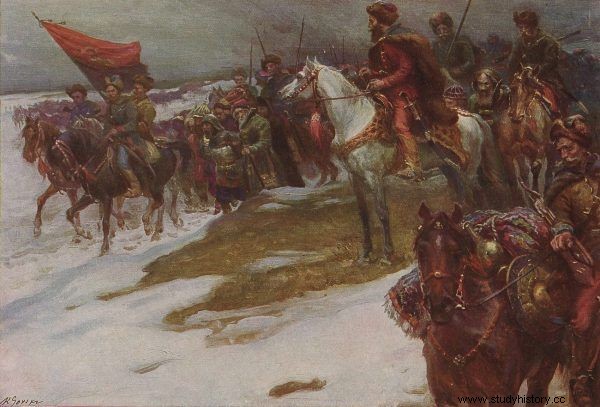When he took his first steps in a soldier's life, it seemed that he was in a losing position. Poor, uneducated and uncouth, he reached the top thanks to a bit of luck and a lot of cleverness. How did he do it?
Czarniecki did not come from a magnate family, did not study abroad and did not show up for the first war expedition with a well-equipped banner. He was born in 1599 as the son of an impoverished nobleman who had 2 fields of land and a mill in Czarnca near Włoszczowa.
Admittedly, Stefan's father made a fortune later (he even received the lucrative starosty of Żywiec), but he could not compete with the most powerful Polish and Lithuanian families. In addition, he had ten sons, so the family cake would not be enough for everyone. For this reason, some of them had to become soldiers.
War instead of university
When magnate heirs made long journeys, visiting foreign universities and studying treatises on military matters, Stefan Czarniecki ended up in a real "academy of murder and plunder" - he was to gain military skills in the infamous unit created by Aleksander Józef Lisowski. Of course I am talking about the foxes.

Czarniecki started his career in the Lisowczyk branch.
In the ranks of this light cavalry, famous for its deadly efficiency and cruelty, he fought on the imperial side in the Thirty Years' War. While still a Lisowczyk, he took part in the battle of Khotyn against the Turks in 1621. Later, already in the regular Crown Army, he participated in campaigns against the Swedes, Russians, Tatars and Cossacks.
By the way, he could see the "workshop" of an outstanding commander, which was the Grand Hetman of the Crown, Stanisław Koniecpolski. He even wanted to host him at the wedding, but historians doubt that the powerful magnate accepted the invitation.
Czarniecki has learned for himself that being the bravest soldier in the service of the Republic of Poland does not necessarily guarantee that the glass ceiling will be pierced and opens the door to the top. Years had to pass before he finally did.

You can read about the greatest leaders in our history in the book "Polish gods of war" . You can pre-order today .
Moreover, under normal circumstances, he would probably remain a middle-level officer who would only be remembered by a handful of military enthusiasts. However, fate had other plans for him. Probably the most extraordinary soldier's career in the history of Poland fell to him.
Two events contributed to this. Firstly, Czarniecki was not among the victims of the Battle of Batoh in 1652, where the Cossacks and Tatars defeated the Crown army and then murdered the prisoners, severely devastating the officers of Jan II Kazimierz Vasa's army. Thanks to this, new opportunities opened up for the ambitious soldier. Soon after the slaughter, he was awarded the title of a crown-footman, and a year later he made his debut as an independent commander.
Secondly, when in 1655 the Commonwealth was nearly flooded by the Swedish Deluge, unlike numerous magnates enthusiastically approaching the Scandinavian invaders, he remained faithful to the Polish king. And the ruler could appreciate it. On January 3, 1656, he made him a regimentary. In other words, Czarniecki was given full authority over the Crown Army and was supposed to show what he had learned in over three decades as a soldier.
***
You can read about the secret of the successes of our greatest leaders in the book "Polish gods of war" . The above text is an excerpt from the chapter devoted to Stefan Czarniecki. If you want to read more about it order today with a discount at empik.com!
The title, lead, illustrations with captions, bolds and subtitles come from the editorial office. The text has undergone some basic editing to introduce more frequent paragraph breaks.
Buy the book at a discount on empik.com

